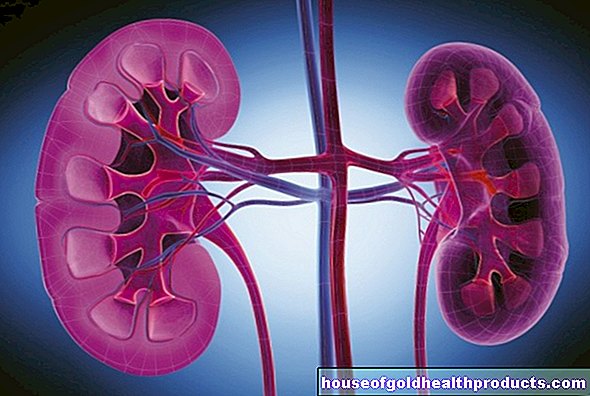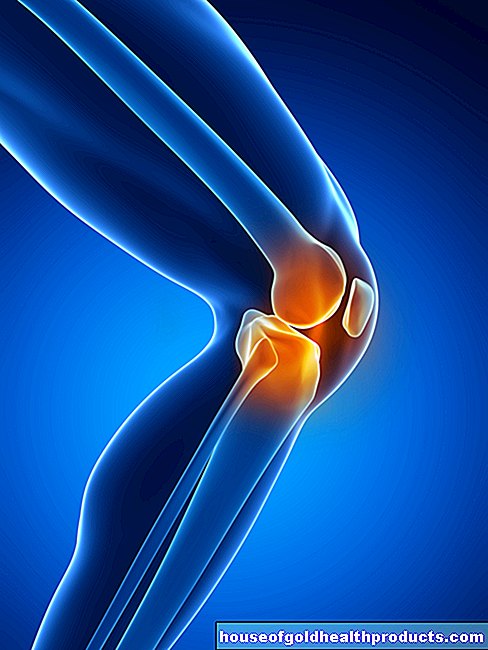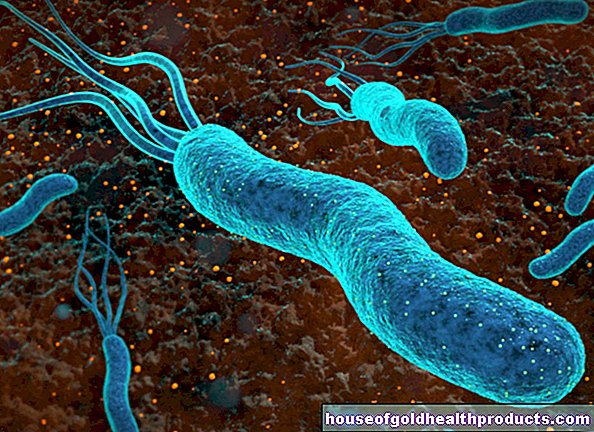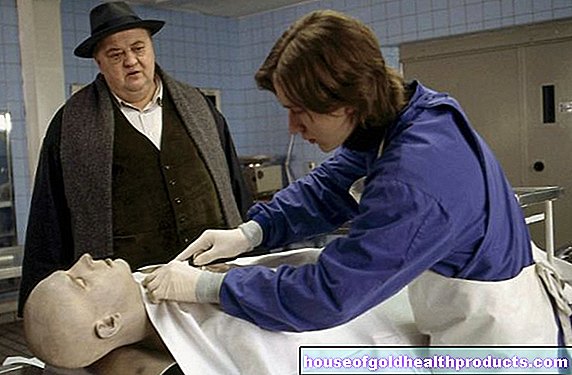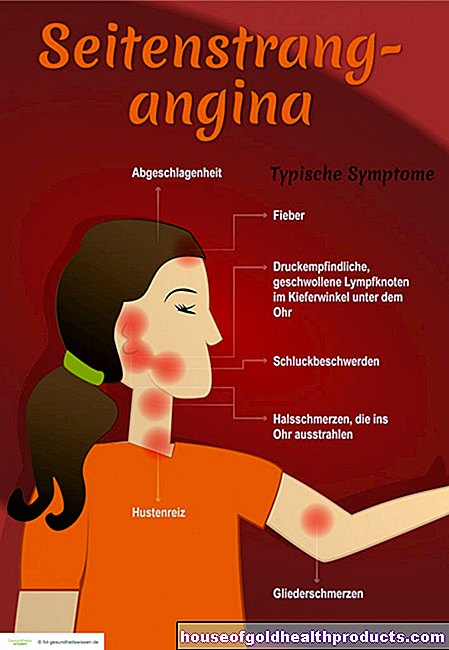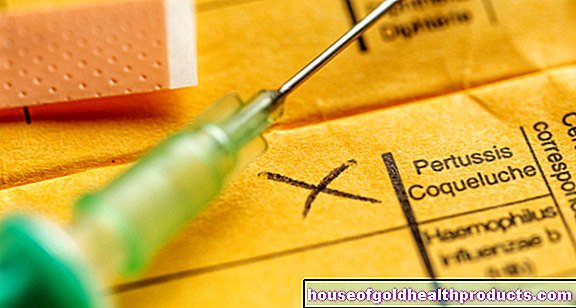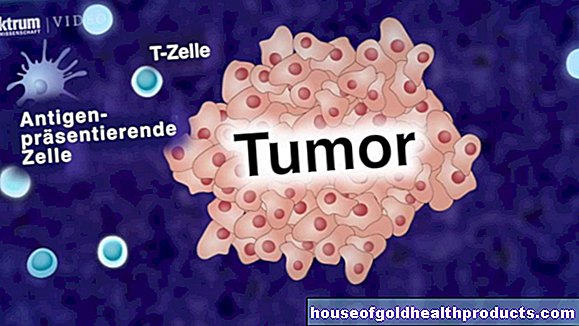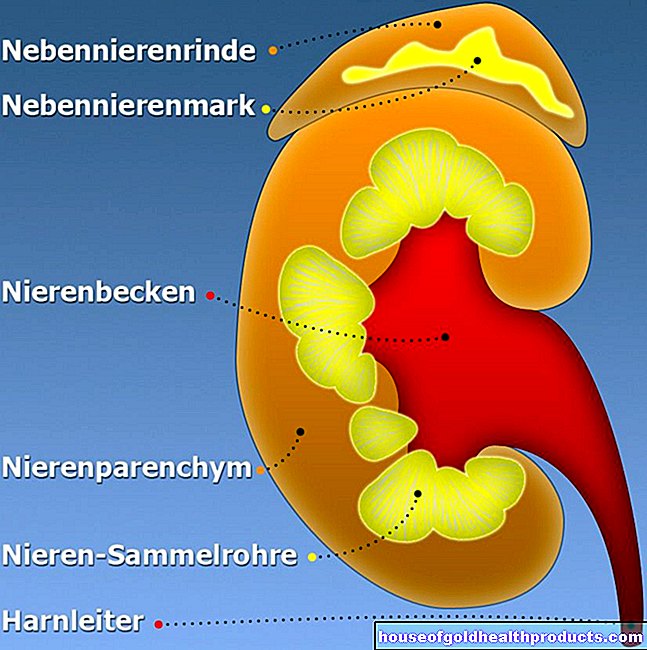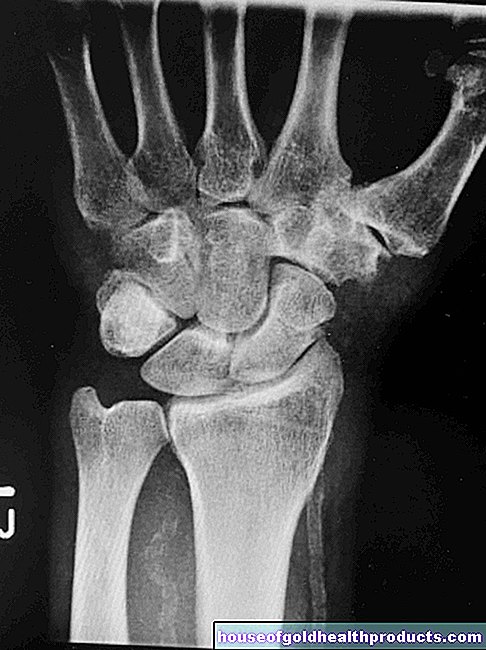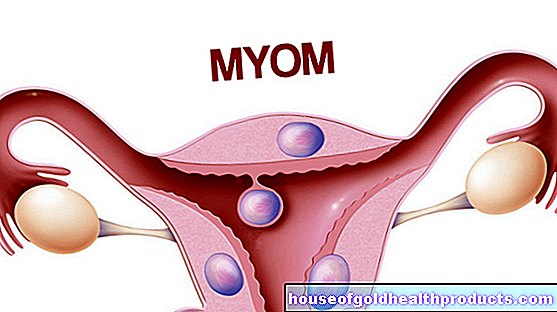Pregnancy depression
Astrid Leitner studied veterinary medicine in Vienna. After ten years in veterinary practice and the birth of her daughter, she switched - more by chance - to medical journalism. It quickly became clear that her interest in medical topics and her love of writing were the perfect combination for her. Astrid Leitner lives with daughter, dog and cat in Vienna and Upper Austria.
More about the experts All content is checked by medical journalists.Pregnancy depression is not uncommon: around one in eight women is affected by it in the course of her pregnancy. If fear and sadness dominate everyday life, it can be a sign of depression. Read here how long pregnancy depression lasts and which treatment is most effective.
ICD codes for this disease: ICD codes are internationally recognized codes for medical diagnoses. They can be found, for example, in doctor's letters or on certificates of incapacity for work. O99

Brief overview
- Symptoms: Persistently depressed, depressed mood, loss of interest and joylessness, lack of drive, self-doubt, feelings of guilt, sleep disorders
- Treatment: Can be treated well with psychotherapy, medication is rarely necessary
- Duration: varies from woman to woman
- Cause: Difficulties in adjusting to the new life situation, previous mental illnesses, problems in pregnancy, partnership or in the social environment
- What is pregnancy depression? Persistent mental crisis during pregnancy in which feelings of sadness and fear dominate
How do you recognize pregnancy depression?
The signs of depression in pregnancy differ from person to person. The most common symptoms are:
- Depressed, depressed mood
Although a long-cherished wish comes true for some affected women with pregnancy, the mood is suddenly at its lowest point. Mood swings and insecurities also occur in a normal pregnancy, but usually go away on their own. If the negative feelings become permanent, however, there may be depression behind them.
- Loss of interest and joylessness
Hobbies and social contacts hardly play a role anymore. What used to give pleasure is becoming less and less important. Social withdrawal and listlessness are red flags that should be taken seriously.
- Self-doubt, feelings of guilt
Pregnant women with depression often experience self-doubt. They fear that they will not be able to develop a relationship with their child or that they will not be a good mother.
In addition, there are expectations from outside: The environment usually expects unrestrained joy from pregnant women. If this is not the case, affected women may feel inadequate and guilty.
- sleep disorders
Those who suffer from fears and worries usually sleep poorly. As soon as the body comes to rest, the carousel of thoughts begins, people brood and lose themselves in their worries. In the morning they are sleepless and tired. Too little sleep in turn puts a strain on physical and mental health in the long run.
If the depression lasts longer than two weeks during pregnancy, please consult a doctor!
Physical signs
Depression not only stresses the psyche, it can also manifest itself through physical complaints. Even those affected often do not recognize possible symptoms such as nausea and abdominal pain as signs of depression, but ascribe them to the physical changes of the pregnancy. The same goes for shortness of breath and sexual problems: they occur in most pregnancies, but can also be a sign of depression.
Sometimes physical complaints can also be signs of pregnancy depression!
Mood swings or depression?
Every expectant mother is familiar with mood swings. They are hormonal and are part of pregnancy. Pregnancy hormones flood the body and create ups and downs in emotions. Pregnant women are overjoyed and confident one day and full of fears and fears the next day. However, the negative feelings usually disappear again, so that the basic mood remains predominantly positive. In the case of depression, on the other hand, sadness and dejection predominate permanently.
The lines between mood swings and true depression are fluid. If in doubt, discuss your thoughts with a doctor!
Postpartum depression
If symptoms of depression only appear after delivery within the first twelve months of the child's life, doctors speak of postpartum depression. The puerperium is the period of time between delivery and the regression of the physical changes in pregnancy and birth. During this time, for example, the uterus contracts again and birth injuries heal. In addition, the mother's hormonal balance switches back to “not pregnant”. This sensitive phase is associated with major changes. In addition, everyday life with the newborn is a new challenge.
If symptoms of depression appear - either immediately after the birth or a few weeks and months afterwards - they are often not perceived as a disease. In particular, those affected often attribute physical signs such as headaches, insomnia or loss of appetite to the stress of their new life situation.
Observe yourself and listen to yourself:
- Have you been crying a lot lately?
- Do you react more quickly to irritation?
- Are you struggling to develop a relationship with your baby?
- Are you mostly sad and feel little joy?
- Do you have doubts about being a good mother?
Phases of uncertainty are part of life. However, if the negative feelings become permanent and do not go away by themselves after about two weeks, it is advisable to get help. The first point of contact for mental problems after the birth is the gynecologist. If necessary, he arranges further therapy offers. Postpartum depression is well treatable. As with pregnancy depression, psychotherapy promises good results.
What to do if you have depression of pregnancy?
There are good treatments for pregnancy depression. The first step to recovery: take yourself and your feelings seriously. Depression is not something to be ashamed of, but an illness - with a favorable prognosis.
Conversation with people you trust
If you have any signs of depression, please get help. First of all, confide in those around you: it can be your partner, mother or a good friend. Sometimes it is enough to openly express the negative thoughts. Midwives are also good contacts. They know the fears and worries of pregnant women and are familiar with all topics related to pregnancy.
The better you and those around you know about pregnancy depression, the better you can counteract it. Depression is a condition that can affect anyone. It's easier to cope with them together!
Medical help
If you do not get out of your emotional depths even with the support of your personal environment, please seek medical help. The first point of contact for depression during pregnancy is the gynecologist. He will first clarify whether it is a temporary low mood or a depression.
To do this, he asks about his personal well-being and possible physical complaints. There are also questionnaires that make it easier to diagnose pregnancy depression. Finally, he examines the pregnant woman to rule out physical causes for the symptoms.
If the doctor diagnoses pregnancy depression, he and the pregnant woman select the most suitable therapy, depending on the severity and extent of the symptoms.
psychotherapy
The best treatment for pregnancy depression is psychotherapy. To do this, the doctor will refer the pregnant woman to a psychotherapist who specializes in depression during pregnancy. In this form of therapy, the focus is on open conversation. The therapist works with the person concerned to develop strategies to cope with the situation and supports them in alleviating their self-doubts and fears. As with any therapeutic treatment, results cannot be expected overnight. Instead, patience is required. Take the time you need!
Medication
If psychotherapy alone is not effective, the doctor will prescribe medication to treat pregnancy depression in addition to talk therapy. Which remedies are used depends on the severity of symptoms and the stage of pregnancy. As a rule, antidepressants are used for depression. They lighten the mood and release the fear. However, it can take up to two weeks for them to be fully effective. Even if these drugs are considered to be relatively safe, taking them is not without risk for the unborn child - especially in the first few weeks of pregnancy. In some cases, for example, the newborn may experience adjustment disorders. Here the doctor weighs the benefits and risks of the treatment together with the pregnant woman. During treatment, he closely monitors mother and child and adjusts the drug dose if necessary.
Antidepressants may only be taken as prescribed by a doctor. Talk to your doctor before stopping the medication or changing the dose!
Alternative treatments
In order to alleviate the symptoms, alternative treatments such as light therapy, acupuncture and hypnosis are also possible. However, their positive effect on pregnancy depression has not yet been scientifically proven. Discuss with your doctor whether these treatments are suitable for you.
What can you do about pregnancy depression yourself?
In addition to medical and psychotherapeutic treatment, there are a few things you can do yourself with pregnancy depression so that you will soon feel better:
- Talk to people close to you (partner, family, midwife) openly about your fears and worries. The crisis can be overcome better together with familiar people.
- Accept offers of support from families and friends (e.g. help with the household).
- Nothing and nobody is perfect: if you struggle with depression during pregnancy, you are not a bad mother.
- Stay physically active, exercise and sport contribute to mental well-being.
- Be indulgent with yourself. Insecurities due to the new life situation are quite normal.
- Do not torment yourself with the thought of being a bad mother. That is completely unfounded. Pregnancy depression is an illness that is beyond your control and will go away again.
- You are not alone! Conversations with other affected pregnant women can help to overcome your own crisis. Let your doctor advise you on where to find a suitable support group.
- Be patient with yourself: depression takes time to treat.
How long does pregnancy depression last?
course
How long pregnancy depression lasts varies from woman to woman. The depressed mood can last for days or weeks. If left untreated, depression can persist beyond birth and turn into postpartum depression.
forecast
Since pregnancy depression can be treated well, the prognosis is favorable. It is important to start treatment early.
Women who struggled with depression in a previous pregnancy have a 60 percent risk of developing it again in another pregnancy. In such cases, it makes sense to consult a doctor or psychotherapist before symptoms appear.
Why Does Depression Occur During Pregnancy?
It is not entirely clear why about twelve out of 100 women develop depression during pregnancy. Depression can occur in any phase of life, including times that are usually associated with happiness and joy for most women. They are among the most common mental illnesses during pregnancy.
causes
The cause of pregnancy depression is often the changed life situation. For most women, being pregnant is an emotional roller coaster. The anticipation of the child is sometimes accompanied by worries and fears: Will I be a good mother? Can I offer my child a good future? Many expectant mothers ask themselves these and similar questions. Most pregnant women have a positive outlook on the future, but sometimes sadness and fear can get out of hand and dominate everyday life. Possible causes for this are:
- Difficulties with the partner: If problems exist in the partnership before pregnancy, women are at a higher risk of pregnancy depression. Insecurities in private surroundings can make negative thoughts about the pregnancy even worse.
- Problems in Pregnancy: Women who have experienced miscarriages or complications in pregnancy are usually more prone to depression.
- Previous mental illnesses: Women who have already suffered from depression regardless of pregnancy or who have other previous mental illnesses are also more prone to pregnancy depression.
- Social environment: Financial worries, little support in the family or stressful events in the past promote pregnancy depression.
What is pregnancy depression?
Pregnancy depression is a mental illness that should be treated professionally. The symptoms are basically identical to those of depression in other phases of life.
During pregnancy, most women experience a variety of emotions, from overwhelming joy to sadness and fear. These mood swings are hormonal and usually nothing to worry about. They are simply part of a pregnancy and usually go away on their own. If negative emotions and worries get out of hand and last longer than two weeks, doctors speak of pregnancy depression.
Effects on the child
Depression during pregnancy not only affects the psychological well-being of the expectant mother, but can also have an impact on the baby: On average, the children of affected women are smaller and are more likely to be born earlier than planned. The reason for this is that the unborn child is exposed to more stress hormones in the womb. After birth, some babies struggle with adjustment difficulties: they may need longer to arrive in their new world.
Effects on Pregnancy
Expectant mothers struggling with depression often gain little weight during pregnancy. They are also more likely to have gestational diabetes than other pregnant women.
Tags: organ systems dental care menshealth
